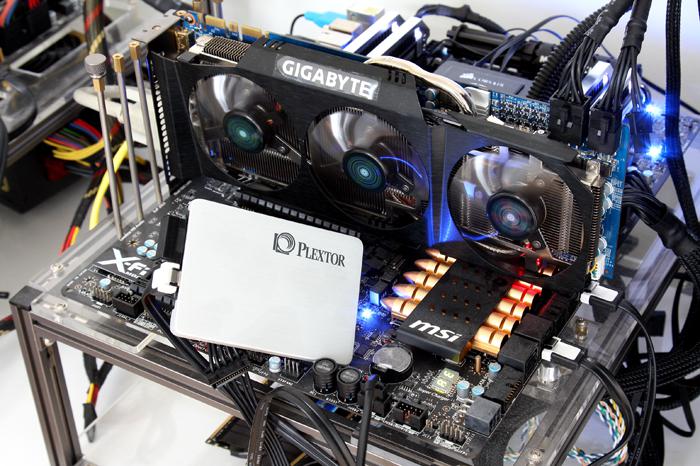Final words and conclusion
Final words and conclusion
This actually is the first Plextor product we have tested in a way too long time, and it definitely is impressive. The peak read performance is grand, the write performance opposed to say LSI SandForce 2281, LAMD and Everest controllers is a little behind that competition but really, nothing you'd ever notice.
Where the Plextor M5 Pro is exceptional is it's overall IO. Especially if you zoom in at IOPS performance then you'll notice that the SSD can manage near silly workloads without breaking a sweat.
So that's testimony towards the new Marvell 88SS9187 controller versus the new Toshiba Toggle NAND memory. Plextor has a very fast SSD in their hands 'overall', and once you pass that 350~400 MB/sec barrier we honestly doubt a little if you'd notice the performance increases over say 500 MB/sec coming from 400 MB/sec. Split second loads are still split second, and that is the generic consensus for all SATA3 SSDs really.
Where the SSD really shines are the trace tests and realistically I personally always focus on the trace tests as it's the best test for your real world experience. This SSD ended in the top 2.
Overall SSD usage
An SSD is enjoyable, very much so. If you put a drive like this into your SATA 3 compatible laptop or SATA 3 compatible PC, you'll have no idea what is about to hit you. We very much enjoy the grand sustained performance of this SSD series, so you you copy a fast amount of compressed data, then the Plextor M5 Pro will perform very fast in performance. Make no mistake, replacing an HDD with an SSD in your desktop PC or laptop eliminates the random access lag of the HDD head, it is no longer mechanical. That combined with the performance SATA3 offers these days is simply a massive difference and probably the best upgrade you can make for your computer anno 2012.
SATA Controllers
Some overall recommendations then. Should you be in the market for a SATA 3 SSD then we have a couple of hints though. First and foremost if you have a SATA2 controller only on your motherboard, then you'll get limited at roughly 270 MB/sec read and writes. SATA3 (6Gbps) will free you up from that allowing the SSD to perform in the 500 MB/sec range. It however is important that you connect your SSD towards the proper controller.
We absolutely prefer the performance of the Intel Series 6 and 7 (H67/P67/Z68/Z77/H77/X79) integrated SATA 6G controller over anything else available in the market. If you run the SSD from a 3rd party controller with say a Marvell 6G controller, you will see lower performance. The new AMD 85X chipsets also offer fantastic performance. The more recent Asmedia controllers we spotted lately on motherboards are also offering good performance, albeit still 20%~25% slower then Intel's controllers. Also make sure you run your drive in AHCI mode, it does make such a difference in performance -- really guys, a big difference.
Prices HDD versus SSD
First a generic rule that I always apply; you probably should stop looking at the Solid State Disk technology as if it were a traditional HDD. We all will be old and grey before the two reach the same prices or top the multiple TB volume storage the HDD offers for less money. Comparing an SSD with an HDD is making a comparison in-between an integrated IGP or a dedicated graphics card, that last one will cost you a heck of a lot more yet you gain incredible overall performance.
It is the very same with an SSD, use it as boot drive on Windows and applications and you instantly have removed a huge bottleneck, namely load and access times. It is a difference in-between night and day (in a proper system). For massive storage like movies, MP3 files and bulky data you do not access on a regular basis, sure that's where the HDD remains the winner as a cheaper storage solution.
Guru3D's rule of thumb; the magic simply is finding a good combination in-between the two and balance things out. Use a nice 240GB SSD for your operating system and applications, and park these movies and MP3 files onto a separate TB HDD. That's where the magic happens. I kid you not, all my test systems and work systems run on SSDs, not once have I considered going back to HDDs. The benefits of a good SSD are simply grand. But that doesn't mean I do not understand the budget and cost dilemma that many of you are facing though.
Concluding
The Plextor M5 Pro SSD really is an excellent SSD with excellent performance and reliability. The one Achilles heel will be sustained write performance at roughly 450 MB/sec -- AS IF that is slow huh ? That number simply is below the competition. Realistically though, and we stated this many times, you'd never ever even notice the write difference as a split second write remains a split second write.
The overall read performance is good, the trace tests shine and the sustained reads are exceptional. If IOPS matter to you for say database utilization then again this is a segment where the Plextor M5 Pro SSD is very strong.
Pricing then, the most trivial factor, especially if the new technology doesn't offer any significant improvement.
- PX-128M5P, 128 GB, 125 EURO
- PX-256M5P, 256 GB, 260 EURO
- PX-512M5P, 512 GB, 520 EURO
US Dollar wise the Plextor M5 Pro 512GB is retailing for roughly $450, 256GB model for $250, and the 128GB model for $130, so that's give or take 1 USD per GB. Prices in EURO are roughly equivalent. So that's a little on the high side.
Pricing aside I do like to add that Plextor offers a really nice warranty, you get 5 years of it. You'll also get access to a disk cloning and backup utility. The Plextor M5 Pro SSD is definitely an SSD series to keep an eye on, without hesitation we can recommend as a premium enthusiast class SSD for the demanding end-user. Very nice.
- Sign up to receive a notice when we publish a new article
- Or go back to Guru3D's front page



